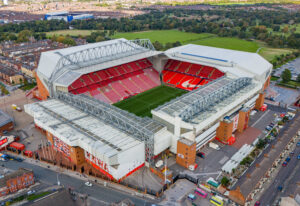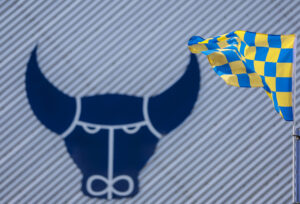The latest section of our British Players Abroad series features one of the most well-known faces of the Premier League era. As a player for Manchester United, Chelsea and a few others, Mark Hughes was universally respected throughout the football world. He has since gone on to have a solid career at management level. There is no doubt that the man nicknamed Sparky is a football legend.
The sanctions imposed by UEFA following the Heysel disaster saw all English clubs banned from European competitions. As a result, many British players fled to the continent, unable to resist both the riches on offer and the opportunity to play at the highest level. Hughes’ transfer from United to Barcelona in 1986 was one of the worst kept secrets in football at the time. It was also one of the most high profile.
Early Beginnings
Born in Wrexham in 1963, Leslie Mark Hughes (his full name) joined Manchester United’s academy straight from school at the age of 16. He made his debut in a League Cup tie against Port Vale, coming on as a substitute in a 2-0 victory five days before his 20th birthday. A month later he made his first start for the club, in the same competition away to Oxford United. He marked the occasion with his first United goal. He was used sparingly during the 1983-84 season, scoring five goals from 17 appearances. In May 1984, he made a goalscoring debut for Wales against England.
Over the next two seasons, he became the focal point of the attack when Ron Atkinson moved Norman Whiteside into midfield. Hughes was also the biggest reason that Peter Beardsley never moved to Old Trafford permanently, as reserve team coach Brian Whitehouse believed the Welshman to be a superior player. In 1984-85, Hughes scored 24 goals in all competitions, and won his first F.A. Cup medal.
United started the following season with ten straight league victories, with Hughes scoring seven goals over this period. It prompted the United fans to believe that a first league title in 19 years might be headed to Old Trafford. Unfortunately for the Stretford End faithful, various events occurred which put paid to that dream. Bryan Robson’s injury curse meant that he played just over half of United’s games that season, and it showed in their form after Christmas. Another key event was that in January 1986, Ron Atkinson agreed to sell Hughes to Barcelona at the end of the season. Following this Hughes, who had been prolific up until that point, scored just four more goals all season.
The move clearly affected Hughes’ form, and he later said in an interview that the main reason was that he didn’t want to leave. In addition to the £2.3 million transfer fee, the transfer reportedly quadrupled Hughes’ wages, whereas United had offered him only a slight pay rise – despite being their top goalscorer. The deal was completed and Hughes became the first, and so far only, Welsh footballer to play for Barcelona.
Barcelona
Anyone who remembers Mark Hughes as a player will note that there were few strikers capable of hitting the ball on the volley like him. A ferocious competitor on the field, never afraid to go into a tackle and with a build like a middleweight boxer. This enabled him to hold the ball up to bring others into play. It also meant that his trademark shoulder charge was a battle he rarely lost. Unfortunately for Hughes, this style of play was not generally accepted on the continent. He would often find himself in trouble with referees, and have the Nou Camp crowd on his back.
Barcelona manager Terry Venables envisaged an all-British strike partnership, and signed Gary Lineker from Everton the same summer. The England striker had just finished as top scorer at the 1986 World Cup and expectations were high. While Lineker embraced the culture and learned the language, Hughes did not. In a recent interview with his old team-mate, Hughes has admitted that he has regrets about this.
There was no doubt that Hughes was homesick, and was not enjoying the experience of playing abroad. Lineker was scoring frequently, including a hat-trick against Real Madrid, which instantly made him a fans favourite. Hughes’ unorthodox style, however, was just not suited to Spanish football.
The partnership between Lineker and Hughes didn’t flourish in the way Venables would have wanted, and he dropped his big money signing towards the end of the season. The Catalan club narrowly missed out on the league title, finishing a solitary point behind arch-rivals Real. Hughes managed just four goals in his solitary season at the Nou Camp and, given the money invested in him, more was expected.
Having failed to settle in Catalonia, Hughes was given the opportunity to further enhance his continental experience in November 1987. German giants Bayern Munich took the Welshman to the Olympiastadion, with a season-long loan which took him away from the pressure cooker environment of the Nou Camp.
Bayern Munich
The move to Germany suited all parties. Hughes had not made a single appearance for Barcelona that season. Venables had been sacked in September following a poor start, and his successor Luis Aragonés had left him out of the squad. The game in Germany suited Hughes, as did the lifestyle.
Under Jupp Heynckes, Hughes began to enjoy his football, not least in part because he was involved once more after spending six months on the sidelines at Barcelona. So eager was he to play that shortly after moving to Bayern, he took part in two matches in one day. After Wales had in beaten by Czechoslovakia in Prague, he was immediately flown back to Munich. Bayern were facing Borussia Mönchengladbach in a DFB-Pokal match. Although Hughes had not initially been named in the club, his similarity in appearance to another Bayern player meant they were able to bring him on as a second half substitute. Although Hughes didn’t score, Bayern came from behind to win 3-2 after extra time.
The style of play in Germany was not too dissimilar to that in England. He also remarked that he settled far quicker at Bayern, thanks in no small part to general manager Uli Hoeneß. The Bavarian side took an interest in his personal life, found him a car and a place to live. At Barcelona, he had been expected to do all this himself. This could have been quite intimidating for a 22 year old living in a foreign country, even a warrior such as Mark Hughes.
Bayern finished second in the Bundesliga to Werder Bremen in 1987-88. It was a trophyless season that saw them eliminated in the quarter-finals of the DFB-Pokal and the European Cup. Hughes had scored seven goals from 23 appearances in all competitions, including a hat trick against VFL Bochum which kept Bayern’s title hopes alive. While Hughes did not hit the prolific scoring form that he had shown early in his career, his style was appreciated more in Munich than in Catalonia. He was popular with the fans who appreciated the fact that he gave everything for the shirt, even when he received a red card in one match.
When Mark Hughes was offered the chance to return to Old Trafford in 1988, he didn’t think twice about it. Despite the fact that he enjoyed his time at Bayern, who wanted to keep him, there was only one choice for Hughes. He wanted to go “home”.
Return to United and later career
It was during Hughes second stint at Old Trafford where he became a club legend. He scored two goals in the 1990 F.A. Cup Final against Crystal Palace to force a replay, which United won. The following year, he put the sword into his old club Barcelona in the European Cup Winners’ Cup Final with another double strike. When Eric Cantona signed for United in 1992, he forged a unique partnership with Hughes, which was instrumental in United winning the first two Premier League titles. His volley against Oldham Athletic in the 1994 F.A. Cup semi-final kept the club’s dream of their first domestic double alive. Always the man for the big occasion, Hughes scored another in the final against Chelsea.
Following the arrival of Andy Cole in 1995, Hughes knew that when Cantona returned from suspension the following season, his chances would be limited. He was out of contract that summer, and moved to Chelsea. At Stamford Bridge, Hughes added several trophies to his cabinet, becoming the first player in the 20th century to win four F.A. Cup winners’ medals. He also lifted the League Cup and the Cup Winners’ Cup, both for the second time in his career.
In his later spells with Southampton, Everton and Blackburn Rovers, Hughes moved into midfield. This change enabled him to play up until the age of 38. At Blackburn, he won the 2002 League Cup before retiring as a player that summer. Hughes had already been the manager of Wales for almost three years, and retiring enabled him to take on the job full time. He did an impressive job for his country, beating Italy and only missing out on a place at Euro 2004 because of a playoff defeat to Russia.
Since then Hughes has had a long management career at Premier League level. He returned to Blackburn, later managing Manchester City, Fulham and Q.P.R. In 2013, he was appointed as Tony Pulis’ successor at Stoke City, a position he holds to this day.
Mark Hughes
An interesting point is that for much of his career, he played almost in the shadow of one of his team mates. At Barcelona, Lineker took the limelight and at Bayern, it was Lothar Matthäus, as the club’s top scorer. Certainly in his later years at United, Eric Cantona received the majority of the plaudits and Gianfranco Zola dazzled everyone at Chelsea. But ask of those players what they think of Hughes, they all hold him in the highest regard. It’s possible that the limelight those players received is why Mark Hughes’ long and distinguished playing career doesn’t receive the accolades it deserves.
There are many factors why Mark Hughes won’t be remembered as one of British football’s finest exports. At the time, he was a young single man living in a foreign country trying to adapt to his surroundings. Lineker, by contrast, was slightly older and happily married, and ready to settle into the Catalan way of life. Lineker’s style also suited Barcelona better than that of Hughes. The Englishman’s tendency to use his pace to run in behind the defenders saw him score prolifically in Spain.
Hughes enjoyed the battles in England with some of the toughest opponents in the league, but this way of playing didn’t really happen in La Liga. When Hughes tried to make it happen, he would usually end up in trouble with the officials. He enjoyed his time at Bayern, the climate and the way of life more similar to England than Spain. Had United not come in for him, Hughes has admitted he would have stayed there.
When he returned to Old Trafford, Bryan Robson remarked about how much of a better player Hughes had become. His first touch had improved, he looked after himself better and had gained maturity. Within two years of his return, United won the first of many trophies under Ferguson and Hughes was a big part of that. He carried on wining silverware at Chelsea, and even in his last season as a player, at Blackburn.
Mark Hughes had a winning mentality that stayed with him throughout his career. Despite the two years he spent playing on the continent not being his most successful, there can be no doubt the experience he gained abroad helped him in later years.
To read the previous articles in this series, click below:
1 – Gary Lineker 2 – Ian Rush 3 – David Platt
Main Photo





